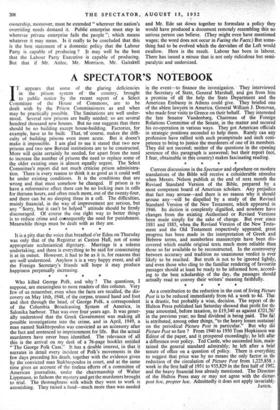Who killed George Polk, and why ? The questions, I
suppose, are meaningless to most readers of this column. Very few of us remember, even when the facts are recalled, the dis- covery on May 16th, 1948, of the corpse, trussed hand and foot and shot through the head, of George Polk, a correspondent of the Columbia Broadcasting System of America, in Salonika harbour. That was over four years ago. It was gener- ally understood that the Greek Government was making all possible investigations into the crime, and in April, 1949, a man named Stakhtopoulos was convicted as an accessory after the fact and sentenced to imprisonment for life. But the actual murderers have never been identified. The relevance of all this is the arrival on my desk of a 76-page booklet entitled "The George Polk Case." It has a double interest, in that it narrates in detail every incident of Polk's movements in the few days preceding his death, together with the evidence given by the convicted man Stakhtopoulos in court, and at the same time gives an account of the tireless efforts of a committee of American journalists, under the chairmanship of Walter Lippmann, to fathom the mystery and get the murderers brought to trial. The thoroughness with which they went to work is astonishing. They raised a fund—much more than was needed in the event—to finance the investigation. They interviewed the Secretary of State, General Marshall, and got from him a promise of all the help the State Department and the American Embassy in Athens could give. They briefed one of the ablest lawyers in America, General William J. Donovan, who made four visits to Greece on their behalf. They interested the late Senator Vandenberg, Chairman of the Foreign Relations Committee of the Senate, in the matter and secured his co-operation in various ways. They got American officials in strategic positions seconded to help them. Rarely can any profession have rallied with such promptitude and such com- petence to bring to justice the murderers of one of its members. They did not succeed; neither of the questions in the opening sentence of this paragraph is answered; but their report (not, I fear, obtainable in this country) makes fascinating reading.
* *


























 Previous page
Previous page